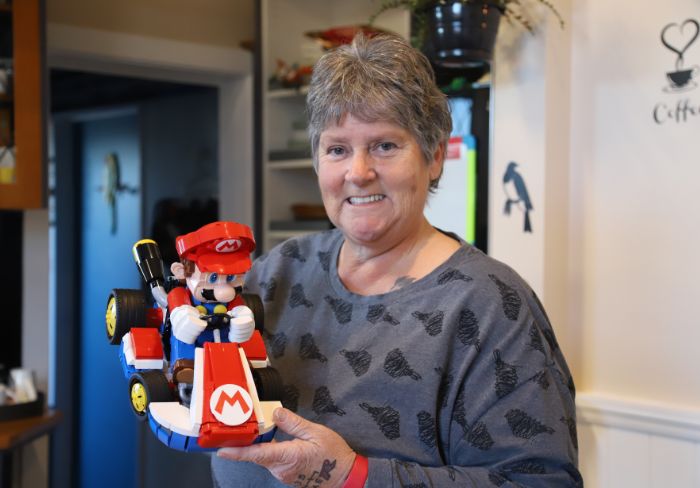He admits taking the videos and images – but says the women consented, or he genuinely believed they were consenting at the time.
The women reject this, saying they had no idea they were being recorded.
Court martial proceedings began today for Smith at Burnham Military Camp before Judge Tom Gilbert.
A court martial is a military court that tries members of the armed forces for violations of military law.
It is a structured legal process, similar to a civilian court, and a decision on guilt or innocence is made by a panel of military members – three in Smith’s case.
If a defendant is found guilty, punishments can include fines, demotions, or imprisonment.
Until today, the Herald could not publish details of the allegations against Smith.
Between August and November 2020, he is accused of “intentionally or recklessly” making an intimate visual recording of a woman.
He is further charged with deliberately making intimate recordings of a second woman in November 2020 and December 2020.
The alleged civil offences contravene the Armed Forces Disciplinary Act 1971.
The names of women have been suppressed. Both were in new relationships with Smith at the time of the alleged offending.
Judge Gilbert also suppressed the specific details of the content of the videos and images.
He said the Herald could only describe the content of the material and “what was engaged in between parties” as “intimate sexual activity”.
Anything outside that description was prohibited.
During the trial, the court will hear from both complainants via audio-visual link, and the panel deciding Smith’s fate will be shown the intimate recordings in question.
A number of other witnesses will also be called.
Prosecutor Flight Lieutenant Hannah O’Byrne outlined the Crown case against Smith this morning.
She said the first woman met Smith in July 2020, and a sexual relationship “progressed quickly”.
During sexual activity at her Christchurch home she “felt something was off” and when she looked up Smith was “pointing his cellphone at her”.
She told him to stop recording and delete the footage.
“She told him off for recording her and he played it off as a joke,” said O’Byrne.
The woman assumed the footage was deleted – but Smith later sent it to her via Snapchat.
Snapchat is a social messaging app where messages are designed to disappear after being viewed or after a set time.
“She told him off again, saying she told him not to do that and it wasn’t okay,” said O’Byrne.
The woman stopped seeing Smith and reported the matter to the police.
The second woman was at Smith’s defence house in Burnham when she was recorded.
O’Byrne said that during sexual activity, Smith took three photos of the woman.
“Without her consent – or even time to discuss what was happening. At the time, she did not realise [photographs were being taken],” said the prosecutor.
Smith sent her the images on Snapchat, and she took screenshots.
She told him to delete the photos, and he “played it off as a joke”.
The pair engaged in sexual activity a few days later.
“She could not see what he was doing,” said O’Byrne.
“She did not realise she was being filmed.”
Later on, she received a message from Smith on Snapchat.
Given his messaging history, she decided to turn on screen recording before she opened it.
It was the footage of her taken during sex.
“She asked if he had sent it to anyone else. He played it off as a joke,” said O’Byrne.
The second woman reported the incident to police, handing over the screen recordings.
The court heard that during their relationships with Smith, they had willingly and knowingly sent him explicit images and video, including naked photos. These were sent via Snapchat.
Both vehemently reject Smith’s explanation that they consented to him filming and or photographing them.
‘Pretty gross’: first woman gives evidence
The first woman began giving evidence before lunch.
“In the video, you can see me trying to swipe his phone away, telling him to put it away,” she said.
She said there had been no discussion before sex about whether Smith could record. When she told him off, he was “very blase”.
“He just said ‘no, it’s all good’,” she recalled.
She said she felt “pretty gross”.
“My privacy had been invaded,” she said.
The first complainant said she later reached out to a woman who had liked Smith’s social media posts.
She learned the woman was in a relationship with Smith.
She said she did not initially tell the woman about the filming incident – but the pair did discuss it at the end of 2021 or start of 2022.
She described it as “trauma dumping”.
“Just trying to figure out where and when… all the lies that we’d been told,” she said.
In a brief opening address, Smith’s lawyer, Matthew Hague, told the panel that his client denied all the charges.
“Let me be clear… what you’ve heard… is just allegations,“ he said.
“It is not evidence. At present… the accused must be presumed innocent.”
Cross-examining the first complainant, Hague suggested that the “making and the sharing of intimate recordings” was a “normal” part of her relationship with Smith.
He said Smith was not “trying to hide” his filming of her and put to her that she did not tell him to stop.
“I did tell him to stop,” she said.
Hague suggested the recording was consensual and the complaint was made up as a way to “get Manu in trouble”.
He suggested the first complainant had colluded with other women who did not like Smith to ruin his life. The women communicated through a Facebook group chat.
The complainant said she initially did not realise filming without consent was an offence.
“I wanted him to hurt as much as he had hurt me,” she said of her decision to go to the police.
When questioned further by Hague about the group messages, the woman admitted she wanted Smith “publicly shamed” and that she considered going to “the media” and “wanted money” out of Smith.
“I wanted him to feel the way he made me feel which was useless and worthless”, she said.
“It’s caused a lot of grief for me so yes I feel like I would be entitled to (money or compensation).”
She denied the allegations were fabricated for any kind of revenge for Smith cheating on her. And while she wanted him to face the appropriate consequences for his alleged actions, she did not necessarily want him “kicked out” of the army.
The woman explained that the group chat was “a safe space” where she and others “vented” about Smith. She had referred to him “messing with the wrong woman” but worried that her comments would be taken “out of context”.
“We’re not making it up at all… I cannot think of anything that would have given him the idea that I was allowing (the filming),” she said.
At the end of the woman’s evidence, Judge Gilbert pointed out to the panel that there was no suggestion or evidence that Smith had sent any other person the images or video of the two complainants.
“This is not a case where that is alleged,” he clarified.
‘I was disgusted’: second woman speaks
The second complainant told the court she met Smith on a dating app and their “extremely toxic” relationship lasted just two months.
Answering questions by prosecutor Captain John Whitcombe, she explained that when she and Smith were not in the same city they sent each other messages – including intimate images. All messages exchanged were consensual.
She said given he was in the army and surrounded by “the boys” she was concerned about where he opened the messages and who may see them.
“I’d say to him often, ‘don’t show these to anyone else’. It was pretty clear they were for his use only,” she said.
She became tearful when asked to recall the alleged covert filming incidents.
“We decided to engage in some sexual activity… then I found myself in the position where he had his phone out and I was in a very vulnerable position… he just thought it was funny” she said.
“I knew that the situation had just escalated. I did not consent for his phone to be out filming the situation I was in. At all.”
There was no discussion about filming before the alleged recording.
“None, whatsoever,” she said.
“I had no knowledge of how many he had taken, only the ones he had sent me (later)… he had his phone out… I didn’t know he was taking those photos.”
When she realised his phone was out she thought “what are you up to? And why?”.
She said to him “what the f**k?”
“I was definitely not amused… everything’s a joke, nothing’s serious for him…(He thought) that there was nothing wrong with what he was doing at all,” she said.
When Smith sent her the images later, she thought it was “weird”.
“I knew that this was weird behaviour and… I thought it was unusual… I instinctively knew something wasn’t right. I ended up screen recording what I was opening to safeguard myself… and he had recorded me doing these things.
“It disgusts me… I don’t know why he sent that to me.”
She said after the incident it was obvious she was not happy with Smith. That made the message he sent even more bizarre.
“I was clearly upset… I was mad and disgusted… I quickly packed up all of my stuff and left. I was disgusted that he had his phone out while we were together,” she said.
“He probably would have thought I was joking or just sassy. He was in his own little world… I didn’t feel comfortable in his presence anymore. I felt violated, I felt taken advantage of… I felt disgusting – like an object more than a person. It was gross.”
She could not remember exactly what she said to Smith but said it would have been along the lines of “what the f*** are you up to?”.
Whitcombe asked if there was anything she could recall doing or saying that might have led Smith to believe she knew she was being filmed and consented.
“We’d never done anything like that before, so it wasn’t normal behaviour. I definitely didn’t consent to it,” she said.
The second time she was filmed she said she was engaging in intimate sexual activity with Smith when she saw the light on on his phone and realised he was recording.
“I was busy, I didn’t have time to take in my surroundings. Then the flash illuminated the area I realised something was going on,” she said.
“When I (really) realised, was when he sent me a Snapchat… it’s not something I consented to at all.”
Whitcombe asked her how the intimate recordings made her feel.
The woman broke down.
“I was so embarrassed. I feel embarrassed that all of you guys have seen all of that stuff… I feel like my trust was absolutely violated in a very vulnerable situation – in an intimate situation,” she said.
“I feel like I’m being sex shamed in a way… I know that I did not consent… and I’m so sorry that you guys have had to see that. The fact that those exist… gives me so much anxiety…”

In cross-examination Hague put to the woman that she was not a reliable witness and had changed details of her version of evensts between reporting the incident and giving evidence in court today.
“I am answering as best I can… and I am answering with as much courage as I can. I think I am a very reliable person,” she said.
Hague accused the woman of “putting a spin” on her story to put herself in “a better light”.
He accused her of failing to properly answer questions put to her in court and “evading questions that undermined (her) narrative” or did not support her claims.
He effectively said the woman had embarked on a campaign to cause as much upset to Smith’s life as she could – including by fabricating her complaint.
“You wanted to end Manu, didn’t you? You wanted to know that Manu was hating life didn’t you? You wanted money… for wrongs you thought he’d done to you? You thought Manu could pay you $10,000 didn’t you?” he asked.
“You made up a lie about the recordings not being consensual didn’t you?
The second complainant conceded that she “hated” Smith, describing him as “an awful human”.
But she denied wanting to “end” him and stood by her allegations.
“I want justice for something I didn’t consent to,” she said.
The court martial is set to continue for at least three days.
Anna Leask is a senior journalist who covers national crime and justice. She joined the Herald in 2008 and has worked as a journalist for 19 years with a particular focus on family and gender-based violence, child abuse, sexual violence, homicides, mental health and youth crime. She writes, hosts and produces the award-winning podcast A Moment In Crime, released monthly on nzherald.co.nz





